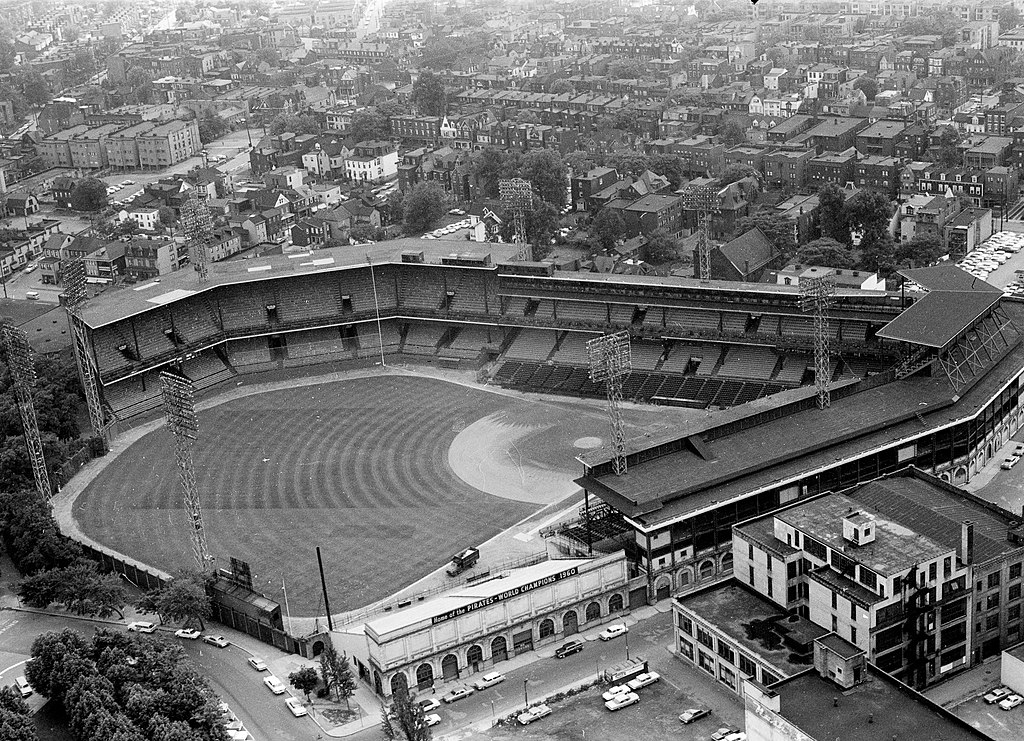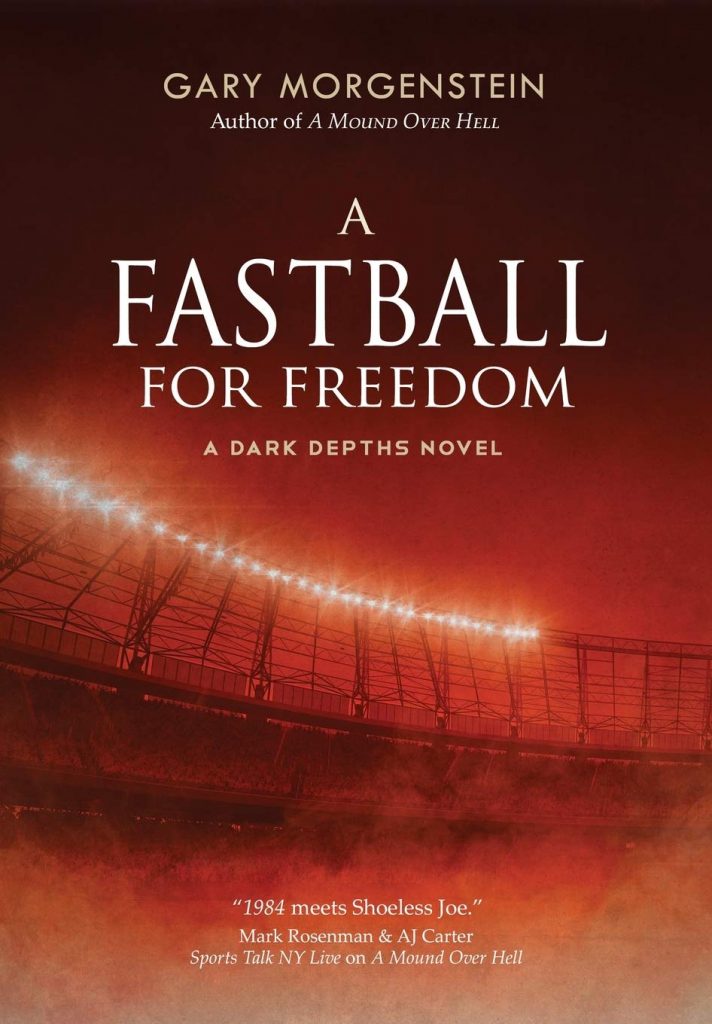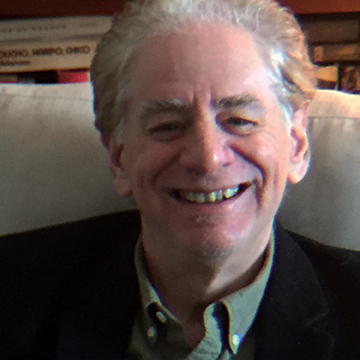If fans think baseball has changed a lot since they were kids, just wait until they find out what Gary Morgenstein has plotted out for the next few decades. In the second installment of his series of books, A Fastball for Freedom (BHC Press, 480 pps, $30.00), Morgenstein presents a dystopian world through the lens of former college pitcher turned baseball historian Puppy Nedick, in the year 2098, baseball having been banned decades earlier.
Morgenstein, who introduced the characters and storyline in A Mound Over Hell in 2018, discussed the universe he has created with SportsMedia Report recently.
SportsMedia Report: You paint a pretty bleak future in ‘A Fastball for Freedom.’ What are some of your inspirations in creating that dystopian world?
Gary Morgenstein: If you step back, humanity has often been mired in potentially horrible possibilities. Just over a year ago, we didn’t know if Covid-19 heralded the end of the world. History is not pre-ordained, like remaining a free country. What happens when the great America, the democratic America, is gone following defeat in World War 3 by the Islamic Empire? Washington, nuked. LA, nuked. Manhattan poisoned by chemical gas. Seventeen million dead. Surrounded, we’re governed by an enigmatic government called The Family led by Grandma, which prizes real relationships and above all, love. Post-identity politics, post-PC, post democracy-capitalism-socialism, throw all the isms out. But at a price. Social media has been banned under the Anti-Narcissism Laws. Banks and the entertainment industry are outlawed under the Anti-Parasite Laws, along with religion and patriotism. And the disgraced baseball, now synonymous with treason, begins its final season ever in Amazon Stadium, formerly known as Yankee Stadium. It is scary. Yet ordinary people get caught up in extraordinary times and become unlikely heroes.
SMR: ‘Fastball’ is the awaited sequel to ‘A Mound Over Hell.’ Why did you choose to have former baseball players as the protagonist and other characters?
GM: The main character is baseball historian Puppy Nedick, a former college pitching star whose career was cut short by injury. He’s joined by Mickey Mantle, Ty Cobb and, from the 2050s-60s, one of the all-time greats, Mooshie Lopez, who happens to be a woman. Together they revive baseball. In A Fastball for Freedom, there’s also a story line about POWs, abandoned by our government, who once comprised the Baseball Brigade before joining the Army. Since baseball will perhaps save the world from another war, it made perfect sense to have baseball players in some key roles.
SMR: Did you use any feedback to reactions to ‘A Mound over Hell’ in the narrative of ‘Fastball,’ or had you mapped out the story?
GM: I’ve always known where the stories would end up. Getting there, now that’s the surprise. I envy those well-organized writers with their index cards and post-its. I have controlled chaos and I’m happy to let the story and the characters take me where they will. That does really happen as precious as it sounds. I can’t tell you how many times I’ve written a scene which turns out completely differently than I’d planned. If a writer can’t be surprised on their own journey, what’s the fun?
SMR: Why did you set the time frame to the end of the 21st century?
GM: When writing speculative fiction and world-building, you need time and distance from today so that the societies you’ve created are unique and different, yet the readers can see some connection to contemporary times from the eyes of 2098, not today. That’s the challenge. For example, social media isn’t banned because of contemporary issues with the tech giants. In my novels, it’s banned because the most important thing are real relationships. I don’t want to alarm anyone, but the 1,000 “friends” you have on Facebook aren’t your real friends. And this is a society where individual responsibility and accountability reigns. No social media influencers. Think for yourself. What a notion, right?
SMR: Who wins the 2099 World Series? What does baseball look like then?

GM: Let’s say the key word in the 2099 World Series is “world”. In the 2099 season, robots rebuild all 30 ballparks which had been torn down after baseball was banned following the 2065 World Series between the Yankees and the Cubs. The parks revert back to their old names. Welcome home Crosley Field, Forbes Field and Candlestick Park. Given that baseball history books were once burnt makes the job of recreating the original specs difficult. Baseball fans also have to learn how to be fans again. There hasn’t been a real season in 34 years. To avoid them getting too rowdy, they’re encouraged to root for all the teams to avoid sectionalism. It isn’t permitted to chant “Boston Sucks.” Plus booing is rude. Holographic historical kiosks are installed at the stadiums to explain the game’s past. The book by Co-Baseball Commissioners Ty Cobb and Mickey Mantle, Baseball, Your Game, helps. Oh yeah, and no one can still bunt. Some things don’t change.
SMR: What is in this for baseball fans?
GM: Dystopian baseball novels are rare because most sci-fi writers don’t think the game will make the cut into the future. Given baseball’s current problems and diminishing appeal, they might have a point. What the novels focus on is the heart and soul of baseball, the romanticism. A Mound Over Hell was called “’1984’ Meets ‘Shoeless Joe’” and A Fastball for Freedom has been hailed as a “dystopian ‘Field of Dreams’”. Baseball is unlike any other sport. Numbers like 511 and 56 have almost spiritual resonance. The game, stats and traditions span the generations and our American history. While the world of my novels is harsh, there is baseball as a sanctuary. When the main character Puppy Nedick enters the new Fenway Park, he says the outfield looks like “God’s front lawn.” If you love baseball, respect baseball, revere the history and have a heavy dose of sentimentality, you’ll appreciate these novels.
SMR: What messages do you hope readers get from ‘Fastball’?
GM: I love the magical connection between the reader and my imagination. There are writers who plant flags and say this is what I mean and this is how you should think and this is a villain and this is a hero. Not for me. My characters are complicated and flawed. I leave them and the story for the reader to make up their own minds and draw their own conclusions because I respect the reader’s intelligence. All I can wish is that even within a dark dystopian world there can be hope for those who believe in themselves and who have faith in others. And the power of love. Oh yeah, and a well-crafted fastball.
Gary Morgenstein’s novels and plays have been featured in national media from The New York Times, Entertainment Weekly, Parade Magazine, the New York Post, Sports Illustrated and Fox News Radio to NPR. His recently published sixth novel is A Fastball for Freedom (“Field of Dreams in a nightmare landscape of darkness”), the sequel to his critically-acclaimed dystopian baseball-science fiction A Mound Over Hell (“1984 Meets Shoeless Joe”). An accomplished playwright, his dramas A Black and White Cookie and A Tomato Can’t Grow in the Bronx are scheduled to premiere during the 2021-22 theater season.
 IBO Boxing Honesty and Integrity
IBO Boxing Honesty and Integrity

